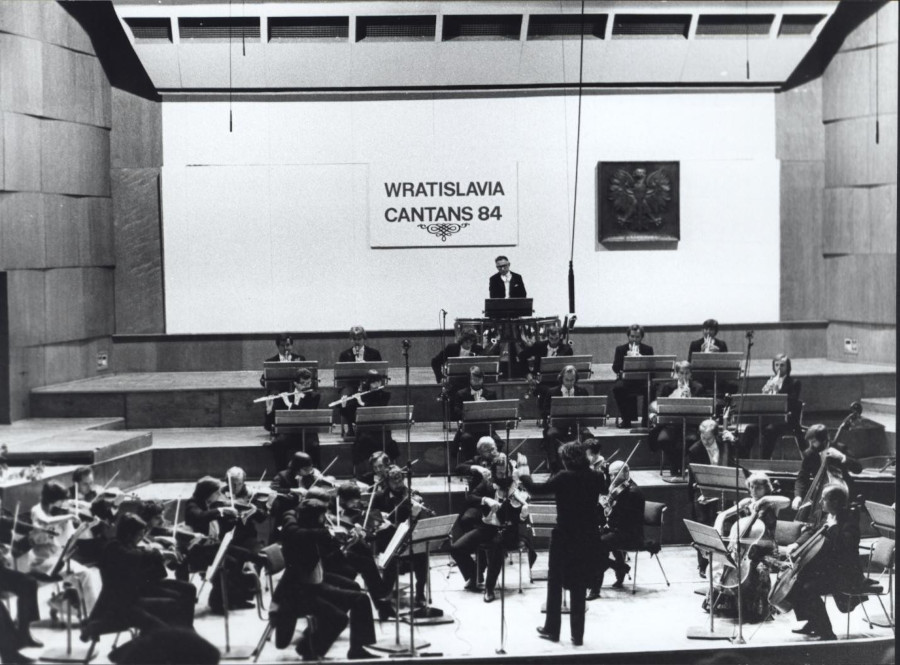During martial law, culture was in retreat. Cinemas, theatres and concert halls were locked down, newspapers ceased to come out, and the citizens had to obey the curfew, which was in force from 10 pm. to 6 am.
For a month, Wrocław music lovers did without concerts, and then there were no queues in front of the box offices.
More popular than Chopin was the song sung to the tune Now Is the War: "Green WRON-a [Military Council for National Rescue, a military body ruling Poland during martial law – translator’s note], / beak emblazoned with braids/ who has not run away, / who does not want to croak, / they will be interned”. Which does not mean that in the 1980s the Philharmonic said goodbye to the guest stars. In 1983, after the end of martial law, Garrick Ohlsson came, and thirteen years earlier, he was the first American in history to win the Chopin Competition [in Warsaw – translator’s note]. He was also awarded then for the best performance of Mazurkas and Concerto with orchestra. He was then twenty-two years old. Today he is one of the leading pianists in the world, he still visits Wrocław and Duszniki. He loves Poland and the local cuisine, especially sour rye soup and bigos. He plays the works of many composers, but he loves Chopin the most. However without mawkishness and exaltation, with intellectual restraint.
Ohlsson was not the only great pianist performing on the Wrocław stage. Music lovers had the opportunity to listen to Michel Beroff, Ramzi Yassa, Marioara Trifan, Chia Chou, Malcolm Frager, Kristian Zimerman, and Rudolf Kerer.
String virtuosos also came to Wrocław. A concert by the Russian cellist Ivan Monighetti turned out to be a momentous event. The artist was the last student of Mstislav Rostropovich at the Moscow Conservatory and a laureate of the International Pyotr Tchaikovsky Music Competition in Moscow in 1974. He made an international career and came to Wrocław as a star.
He got involved with Poland early, he performed in our country for the first time in 1979 at the “Warsaw Autumn” International Festival of Contemporary Music. He currently lives in Switzerland and is a lecturer at the Academy of Music in Basel and a visiting lecturer at the Conservatory of Queen Sofia in Madrid.
There were also guest conductors, among others Chikara Imamura, freshly after winning the International Grzegorz Fitelberg Competition for Conductors in Katowice. And although several years before, Imamura had won the third prize in Japan’s Herbert von Karajan Conducting Competition and appeared on European stages, it was only the first prize in Katowice that made him perform regularly with Japanese and European orchestras, including with the La Scala Milan Orchestra or the Berlin Philharmonic.
It was with immense joy that we watched Agnieszka Duczmal with the Polish Radio Chamber Orchestra “Amadeus”, giving concerts since 1968. Duczmal founded it as a student at the State Superior School of Music in Poznań. Later, she was the first female conductor to perform at La Scala in Milan. In 1976, the ensemble received the Herbert von Karajan Silver Medal at the International Meetings of Orchestras in West Berlin. In 1982, the conductor was recognized by the jury of the “La donna del Mondo”, or “Woman of the World” award, which was awarded by the Saint Vincent International Cultural Centrein Rome (under the patronage of UNESCO and the President of Italy) for outstanding achievements in the field of culture, science and social activities.
Duczmal was the first female conductor to climb to professional heights in this male-dominated discipline. When asked whether the work of a conductor is more difficult for a woman than for a man, she replied to Gazeta Wyborcza: “Beginning in this profession is difficult, regardless of gender. One person stands in front of a large group of people and is to make everyone unite and emanate one musical spirit. They are to become an orchestra, the biggest and most beautiful instrument in the world.”
We saw more of such “beautiful instruments” in the 1980s: the Korean Philharmonic Orchestra surprised with its Eastern interpretation of a European programme, the Leningrad Philharmonic Orchestra (about which the Italian Tempo wrote: “Otherworldly”) confirmed its class, and the BBC Scottish Symphony Orchestra attracted everyone’s attention thanks to the person of its Artistic Director Jerzy Maksymiuk.
It is also worth remembering that the 1980s was the beginning of building Wrocław’s power as a guitar capital inviting excellent classical guitar virtuosos: Piotr Zaleski, Ildefonso Acosta Escobar and Aldo Rodriguez from Cuba, Jorge Fresno and Pablo de la Cruz from Spain, Dagoberto Linhares from Brazil, Roberto Aussel and the duo Jorge Cardoso – Ricardo Moyano from Argentina.
These concerts were to bear fruit a decade later, when Krzysztof Pełech invented the “Guitar +” International Festival. We have gained a musical celebration that attracts guitarists and fans of this instrument from all over the world to Wrocław. The city got to be spoken about more and more.
Beata Maciejewska

